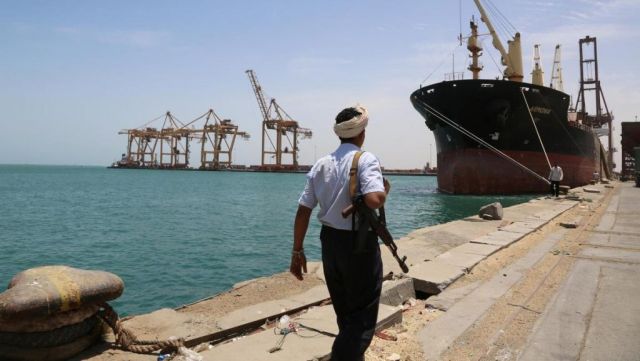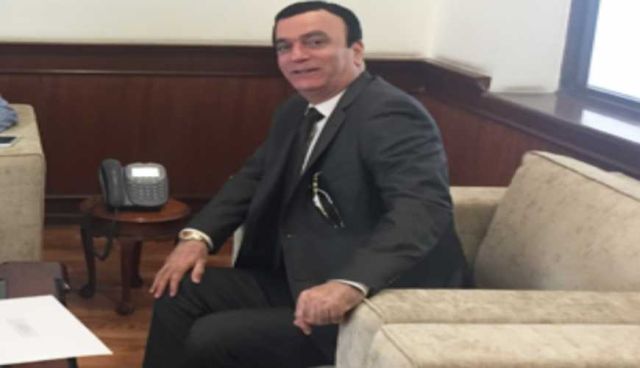
by admin | May 25, 2021 | Interviews, Muslim World

Hudaydah port
By Aroonim Bhuyan,
New Delhi : The Houthis, the Shia majority armed group allegedly allied to Iran, is using a key port in war-torn Yemen to import arms instead of allowing in aid material, UAE Ambassador to India Ahmed Albanna has said.
“The Houthis now are actually using the port of Hudaydah to import weapons and arms,” Albanna told IANS here.
“Also they are confiscating all the international aid — goods that are sent to Yemen to help the Yemeni people.”
The port of Hudaydah is Yemen’s main lifeline for the import of humanitarian aid.
The United Arab Emirates (UAE) is part of the Saudi-Arabia led coalition that launched a military intervention in 2015 to influence the outcome of the Yemeni civil war in favour of the internationally-recognised government of President Abdrabbuh Mansur Hadi.
The Houthis seized power in Yemen’s capital Sana’a and eastern regions of the country in 2014-15, forcing the Hadi government into exile, from where it requested armed support from its Sunni neighbour Saudi Arabia.
The ensuing civil war plunged the nation into a humanitarian crisis. According to the UN, which has limited access to Yemen, hundreds of thousands of people have fled fighting and as many as eight million people were on the brink of starvation.
Albanna said that the UAE and the Arab coalition will strongly support the work of UN Special Envoy to Yemen Martin Griffiths.
“We continue to support a political solution in Hudaydah,” he stated, describing the Houthis as a minority party that is occupying the city and port of Hudaydah
“They consist of very small percentage of the Yemeni people,” he stated. “This military occupation violates international and humanitarian law.”
According to the Ambassador, the Houthis are positioning themselves in hospitals, schools and municipal buildings and are using human shields to protect their own interests.
“So, the Arab coalition will ensure that there is a halt to those illegal activities,” he said.
“We are very much for the implementation of the UN Resolution 2216.”
Adopted in 2015, the UN Resolution calls on all parties in the embattled country, in particular the Houthis, to immediately and unconditionally end violence and refrain from further unilateral actions that threaten the political transition.
Albanna said that the Arab coalition is working to free the port of Hudaydah so that ships can unload humanitarian aid, medicines, food and other supplies for the needy people in Yemen.
“We, the Arab coalition and the United Arab Emirates, work very closely with the UN organisations, UN agencies such as the WFP (World Food Programme) and the Unicef to make sure that food, shelter, medicine reach the needy people in Yemen,” he said.
“The action that was taken by the Arab coalition in the city of Hudaydah and specifically in the port of Hudaydah I think eventually it will put the pressure on the Houthis to come back to the table of negotiations.”
Albanna said that the Arab coalition’s action will force the Houthis to work out a political solution with the legal government of Hadi that has been elected by the people of Yemen.
Stating that the Arab coalition was interested in bringing back peace in Yemen, he said: “We are interested in restoring the official government in Yemen that has been elected and has been agreed upon by all parties. So, therefore, our actions lately, particularly in the city and port of Hudaydah, eventually will sort out and somehow will ensure that the Houthis abide by international laws and rules.”
(Aroonim Bhuyan can be contacted at aroonim.b@ians.in)
—IANS

by admin | May 25, 2021 | Interviews

UAE Ambassador to India Ahmed Albanna
By Aroonim Bhuyan,
New Delhi : Even as the US-imposed sanctions on Iran has put India’s energy security in jeopardy, UAE Ambassador to India Ahmed Albanna has allayed fears of an oil shortage, saying his country as well as Saudi Arabia can fill in if supply from Iran is disrupted.
“In the international market, the law of demand and supply controls the prices,” Albanna told IANS here in an exclusive interview when asked about rising fuel prices in India.
“Production is the important element there… to ensure that the production is enough for the world consumption of oil,” he said.
He said that consumer countries have been faced with most of the problems because of challenges faced by some Organisation of Petroleum Exporting Countries (OPEC) countries as also non-OPEC countries.
However, at the same time, he said that India need not fear shortage of oil with the new US sanctions on Iran set to take effect in November this year. Iran is the second-largest supplier of crude oil to India, supplying more than 425,000 barrels of oil per day, and India is one of the biggest foreign investors in Iran’s oil and gas industry.
“There was some disruption during the embargo against Iran years ago,” Albanna said.
“Saudi Arabia was able to rectify the matter and supply India in the face of the shortage that took place because of the embargo,” he said.
“The same thing will happen this time I guess in November, when the embargo takes place.”
The Ambassador said that because India enjoys a “great relationship” with the United Arab Emirates (UAE), Saudi Arabia and Iraq, “the alternatives are there all the time”.
Regarding energy giants Abu Dhabi National Oil Company (Adnoc) and Saudi Aramco jointly investing in the development of the $44-billion Ratnagiri refinery and petrochemicals complex in Maharashtra, Albanna said that it is a “strategic project” with a trilateral arrangement.
“Due to the close and strategic relationship between the UAE and Saudi Arabia and between India and both UAE and Saudi Arabia, we have been able to reach such an agreement,” he said. “It will be beneficial to all parties.”
Earlier this year, the first consignment of two million barrels of crude oil from the UAE for India’s strategic petroleum reserve in Karnataka’s Mangaluru landed on the west coast. This consignment fills one of the two strategic reserve caverns at Mangaluru under an agreement between Adnoc and the Indian Strategic Petroleum Reserves Ltd (ISPRL).
Albanna also highlighted the close ties between India and the UAE which were elevated to that of a Comprehensive and Strategic Partnership during Prime Minister Narendra Modi’s visit to the Gulf nation in August 2015, the first prime ministerial visit from India to that country in 34 years.
This was followed by the visit of Abu Dhabi Crown Prince and Deputy Commander of the UAE Armed Forces to India Sheikh Mohamed bin Zayed Al Nahyan in 2016 and then again in 2017 as the chief guest for India’s Republic Day celebrations. Modi again visited the UAE last year where he delivered the keynote address at the World Government Summit in Dubai.
Stating that India is one of the first countries with which the UAE has signed a strategic agreement, he said there are collaborations at many different levels.
“Whether we talk about traditional sectors like oil and gas and the normal trade and also the new sectors such as cooperation in airspace, cooperation in IT, IT manufacturing, cooperation in security and security exchange, security information exchange, and also in solar energy,” he said.
“If we look at the bilateral trade between the UAE and India, India is trading partner number one (for the UAE) with a total value of $57 billion,” Albanna said.
“If we look at the Indian side, the UAE is the third-largest trading partner after China and the US.”
Stating that all these show the importance of the India-UAE relationship, the Ambassador said that it “reflects the vision of our leadership to look at this bilateral trade and to make it further grow”.
He also referred to UAE Foreign Minister Sheikh Abdullah bin Zayed Al Nahyan’s week-long visit to India last month and said that there are many outcomes of the visit “which we are now at the stage of following up and look at the best way of implementation”.
The UAE is home to a nearly three million-strong expatriate Indian population.
(Aroonim Bhuyan can be contacted at aroonim.b@ians.in)
—IANS


